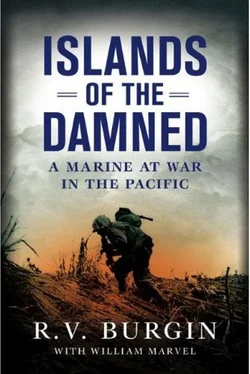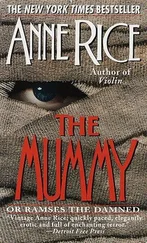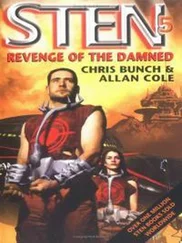I looked down, expecting to find a bloodied Jap crumpled in the bottom of Sarrett’s foxhole. Instead, there was a land crab that had tumbled in sometime during the night.
That crab gave us the first laugh we’d had in many weeks.
Beyond Dakeshi village we got held up at one particularly long, low ridge. Twice our men had made it almost to the top, only to be thrown back and pinned down in the valley. Each morning before they moved out, our artillery would raise hell, firing shell after shell over the crest. It wasn’t doing a damn bit of good.
I watched from my forward position, directing the mortars, trying to figure out why artillery wasn’t doing the job. It was passing over the ridgetop and exploding on the far side. It should be catching the Japs.
Something had to be running just beyond the crest that was sheltering them, something like a gully or a trench. The Japs could lay up in there protected from our artillery, then pop out and start firing when we moved up the slope.
The difference between artillery and mortar fire, as every Marine learns in boot camp, is that mortar fire drops down at a steep angle. You can’t hide from it in a hole or a trench.
I called back to the mortars and explained to the men what I wanted.
“Register one gun to fire from right to left, the second to fire left to right, and the third to fire all along the crest of the ridge.” Sledge, Shelton, Santos, Redifer, Sarrett and the others instantly got what I had in mind.
Scotty did not.
He came on the phone from the gun pits. “You can’t do that!” he said. “We don’t have enough ammo.”
I’d had differences with Scotty before on setting up the mortars. I would be out on the line somewhere, and when I came back he would have them set up where they were subject to rifle fire from any angle. I’d have the guys move the guns to where at least they had some protection.
Then they’d have to re-dig all the foxholes. They didn’t mind, because they knew that’s where they should have set up to begin with. But nobody wanted to question Scotty’s decisions. I had been through this a couple times already on Okinawa. Now I had to do it again.
I needed twenty rounds per gun, sixty shells in all, that I could throw at that thing. I knew damn well there had to be something there. I had them covered.
Scotty and I had a pretty good powwow over the phone. I tried to explain the situation and why my plan would work, but he didn’t see it. Finally I thought, This is getting us nowhere. I called the company command post and explained what I wanted to do. “Can you spare us the ammo?” I asked.
“No problem,” they said.
Scotty was back on the line, fuming. “I order you not to fire,” he yelled.
I ignored him.
“Mortar section, fire on my command! Commence firing!”
Whatever Scotty had to say was drowned out in the bump-bump-bump of mortar fire.
Bill Sloan wrote in his book The Ultimate Battle that I told Scotty to go to hell. I want to clarify that. What I said was, “Scotty, if you’re going to be so damned observing, get your ass up here on the front line where you can see what’s going on.”
That’s exactly what I told him. But I didn’t tell him to go to hell. He was my lieutenant.
K Company took the ridge without further trouble, and I didn’t hear any more from Scotty. But when I got to the top I took a few minutes to look around. Sure enough, there was a narrow gully running right behind the crest. And laid out in the gully, almost side by side, I counted the bodies of more than fifty Japs.
* * *
We moved on, ridge to ridge, until we hardly knew anymore which was which. After days of shelling they were all as bare as plucked chickens. We moved along a narrow road between stone walls, always five paces apart. Keep moving! Don’t bunch up! All the time we were working our way closer to Wana, the last ridge before Shuri Castle.
We were to relieve the First Marines, who had cut around the west end of the ridge and had been working their way east up Wana Draw. Three times they had been forced back under intense fire from the heights. Now they were exhausted. While the Seventh Marines concentrated on the ridge itself, to our left, we started fighting our way back up the draw, supported by tanks. The walls of that thing were two hundred feet high in places, and we saw more of the strange, horseshoe-shaped tombs the Okinawans carved out of solid rock. Whole families were buried in them, going back generations. The Okinawans considered them sacred ground. But the Japs fortified them and set up their antitank guns and mortars to fire down on us. They quickly knocked out two of our tanks and forced us back, but not before we were able to call in fire on two of their positions from the battleship Colorado .
Our Second Battalion managed to get a foothold on Hill 55, which anchored the west end of the draw. On the next morning, May 20, we started up Wana Draw again, making progress.
I felt a little uneasy that morning. It wasn’t a feeling I could describe. As I said, I never for a moment believed I wouldn’t come home from the war. But I was no fool. I knew that I could come home wounded or crippled.
The Japs started firing at us from the left, with a 150mm gun up on the ridge. Jim Burke and I were up front observing, and when those big shells started landing around us we thought we’d better get the hell out of Dodge. We ran down the slope to where there were a couple shell holes and Jim jumped into one and I tumbled into another. Just as I hit the bottom, there was a terrific crack just behind me, on the edge of that thing. I felt that force go right through me, and then dirt and rock come raining down. For a moment I couldn’t see a thing, couldn’t breathe. I was buried. I clawed my way out, caked with dirt, bruised and sputtering. I don’t remember being relieved, thinking I’d had a close call. As a matter of fact, I don’t remember much from the rest of that morning.
That afternoon about two o’clock we were sitting somewhere nearby, out in the open. That big ridge was still right in front of us and Marine and Navy planes were working it over, strafing and dropping bombs. Artillery was going on both sides. We were in the middle of it.
For some reason our new corpsman, Wesley Katz, took it into his head at that moment to start praying. Doc Caswell, who had been with us since Peleliu, had been wounded a couple days earlier, during the push up Wana Draw with the tanks.
I had nothing against prayer. I’d prayed myself from time to time, always quickly and silently. But Doc Katz was praying loudly. You could hear him over the roar of the airplanes and the rattle of shells. I reached over and patted him on the shoulder and said, in a soft voice, “Let’s just have a silent prayer here, son. It’s not doing the other troops any good.”
He bowed his head and finished his prayer in silence.
A short time later I was sitting on my helmet eating ham and lima beans from a can when a big shell smacked down maybe fifty or a hundred yards away. Just a flash and a crack! The impact knocked me off my helmet and at the same time I felt something sting the back of my neck.
I sat on the ground for a moment, then reached up to brush away whatever was on my neck. I felt something hard and sharp, and this chunk of metal fell on the ground. It was about as long and as big around as my finger, tapered and real jagged. I reached down to pick it up but it was hot and I dropped it. I waited a second and picked it up again. I looked at it and put it into my pocket. I felt blood trickle down my neck.
Katz was at my side. He started dressing the wound. It had been numb but now it was starting to really hurt. Three or four minutes had gone by. Doc poked me with a syrette. I stood up and turned my neck just to make sure everything still worked. Nothing was broken.
Читать дальше











